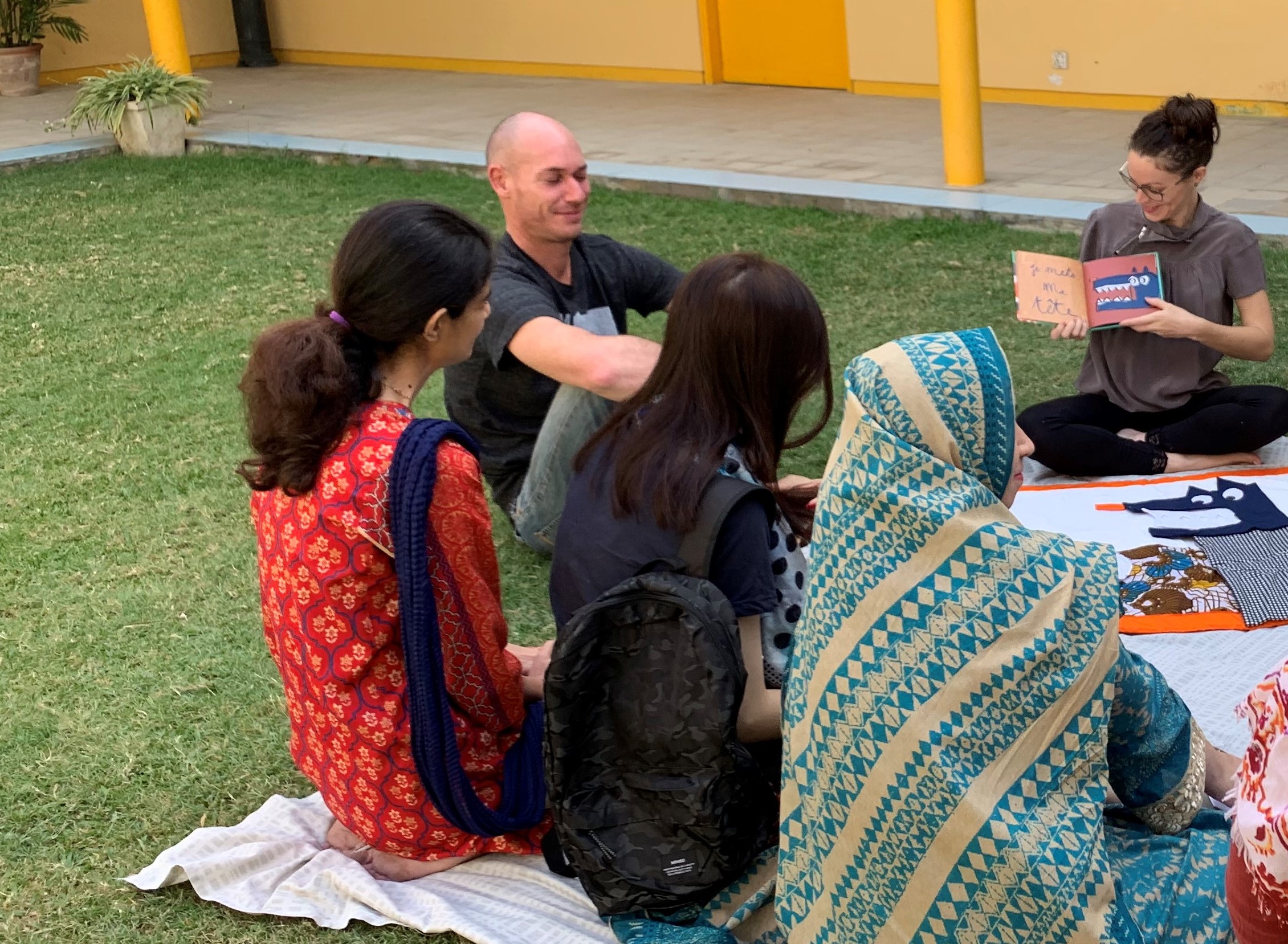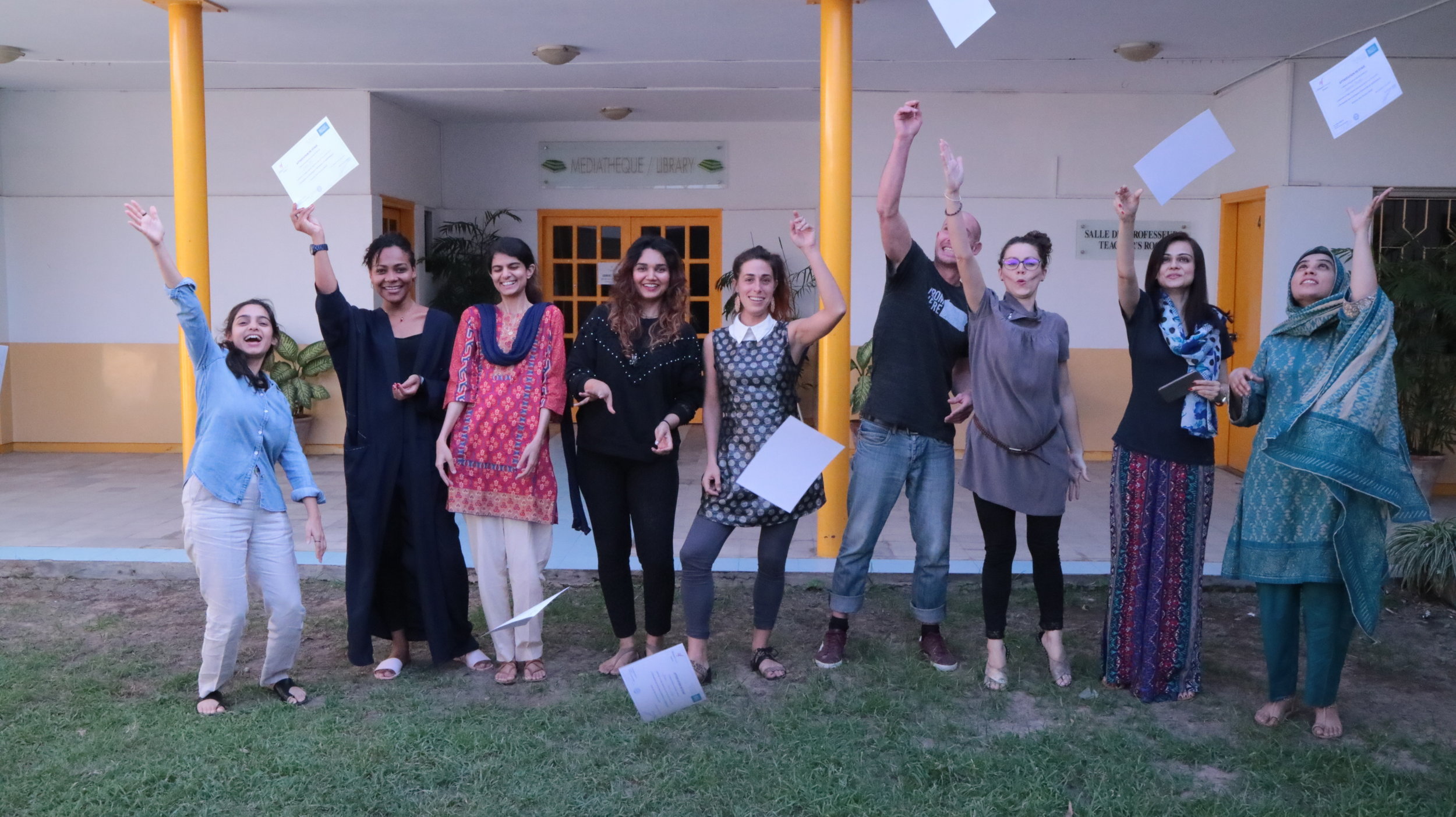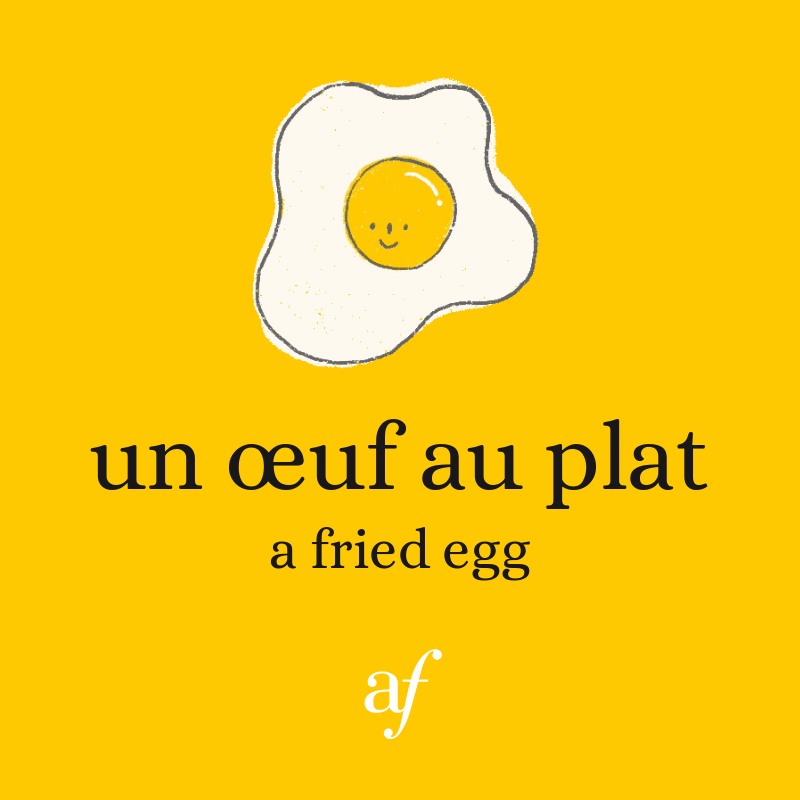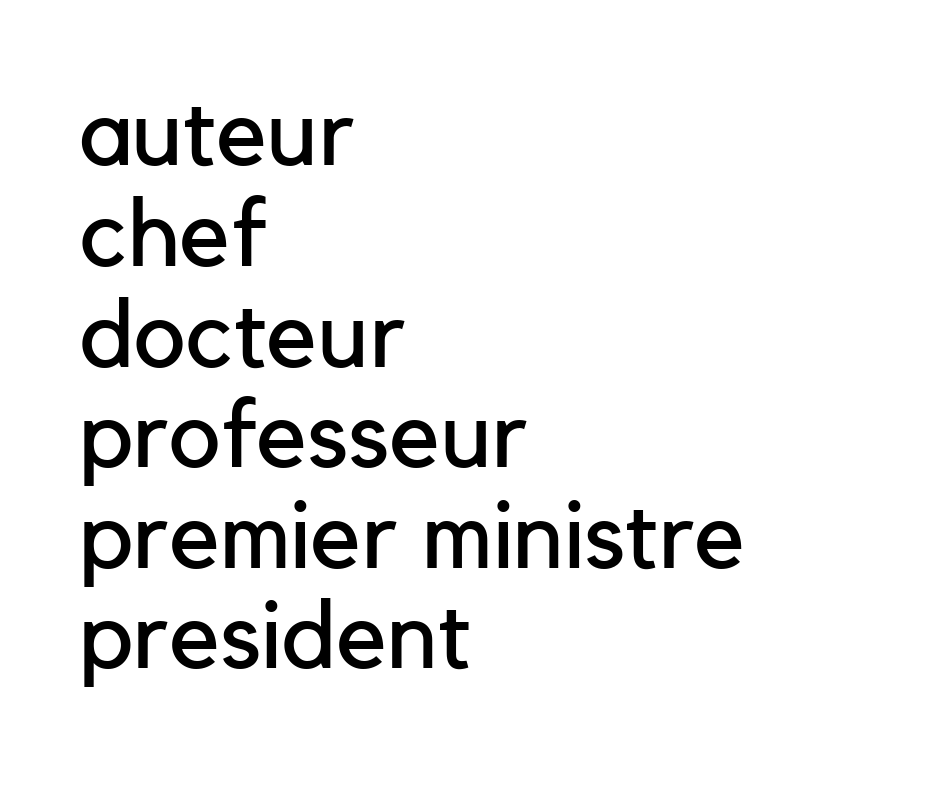French Vocab
Learn French words and phrases everyday with our daily vocab videos (complete with audio pronunciations and example sentences!) shared on our social media profiles and blogs. Follow along!
Je vais en avant et pas en arrière.
I’m going forward, not backward.
Je bois mon café.
I’m drinking my coffee.
Je porte une robe verte.
I’m wearing a green dress.
Un carré ne rentre pas dans un rond.
A square doesn’t fit in a circle.
Je suis à l’intérieur de la maison.
I’m inside the house.
Les princesses aiment les diamants.
The princesses like diamonds.
J’aime bien ce fromage.
I really like this cheese.
La fraise est un fruit rouge.
A strawberry is a red fruit.
Fais glisser ta souris vers le bas.
Slide your mouse pointer down.
Je glisse à droite avec mes skis.
I turn right on my skis.
Mets-toi de la crème solaire pour ne pas attraper un coup de soleil.
Put on some sunscreen so that you don't get sunburnt.
J’ai mis une plante verte dans mon salon.
I put a potted plant in my living room.
Je regarde vers le haut.
I’m looking up.
Le prince a offert des roses à la princesse.
The prince offered roses to the princess.
C’est du blabla.
It’s just empty talk.
Je regarde des insectes avec une loupe.
I’m looking at insects with a magnifying glass.
J'ai changé les ampoules.
I changed the bulbs.
Je prépare un œuf au plat à la perfection.
I make the perfect fried egg.
Étendez votre cercle d'amis.
Expand your circle of friends.
Mets le sablier en route pour jouer.
Turn over the hourglass to begin playing.
On voit les yeux du hibou dans la nuit.
We see an owl's eyes in the night.
La tour Eiffel est le monument le plus célèbre de Paris.
The Eiffel Tower is the most famous monument of Paris.
Reintroducing: Classical Music Without Borders
Classical music aficionados in Karachi are in for a treat. Learn more.
Classical music aficionados in Karachi are in for a treat…
We are pleased to introduce a unique international concert series for Karachi: Classical Music Without Borders. Musicians from around the world will perform national and international classical hits, from Baroque to traditional Japanese music, from Rossini to Gershwin. Karachi listeners will have a unique opportunity to enjoy top string, woodwind and brass players as well as international level opera singers and pianists at the the Alliance Française de Karachi and other venues.
The series first kicked off in 2018 with a traditional Japanese concert by koto player Sumie Kaneko at the Alliance Française de Karachi on 8 October 2018, followed by classical music from France, Germany, Italy, and Russia.
The series is now in its second year with the Trio Zipang from Japan kicking off this season at the Alliance Française de Karachi on 20 November 2019, to be followed by musicians from France, Germany, Italy, and Russia.
This initiative is spearheaded by the Consulate of France in Karachi in partnership with the consulates of Germany, Italy, Japan, and Russia, as well as the Alliance Française de Karachi and the Goethe Institut. We thank our sponsors Oman Air, Gerry’s, and PC Hotels.
Updated: 20 Nov 2019
Campus France opens in Pakistan
Campus France promotes French Higher Education and provides support services to Pakistani students. Students can visit, write an email or call the Campus France office for any query about studying in France from admissions to scholarships to accommodation to visas and everything in between.
Campus France Pakistan and the Embassy of France in Pakistan inaugurated Campus France Pakistan's office and launched a communication campaign Bienvenue en France (Welcome to France) on Monday, October 28 2019 within the premises of Alliance Française of Karachi.
The event included the inauguration of Campus France office, a press conference for the launching of “Welcome to France” communication campaign, and the signing of an MOU for the co-management of the local website France Alumni Pakistan.
Campus France office promotes French Higher Education and provides support services to Pakistani students. Students can visit, write an email or call the Campus France office for any query about studying in France from admissions to scholarships to accommodation to visas and everything in between.
The "Welcome to France" campaign is aimed at attracting more international students to France, increase in number of programs taught in English, Improving student's welcoming services and much more.
The Ambassador of France to Pakistan: H.E. Dr. Marc Baréty, The Consul Général of France in Karachi: Mr. Didier Talpain, the Director of Communication of Campus France: Florent Bonaventure, Ministry of Europe and Foreign Affairs: Thibaut Dutruel, Higher Education Attachee: Sebastien CARTIER and Head of Campus France Pakistan: Shabahat ASGHAR were part of this event.
Something old, something new...
Our library and café recently got a makeover. We went around with our camera to explore…
There’s change in the air at the Alliance Française de Karachi!
Our library and café recently got a makeover. We went around with our camera to explore…
Côté Jardin, our little café by the gardens, got a major overhaul. There's a new menu, a new chef, plants, and lots of art, photography, and posters on the walls.
Meanwhile, in the library, the books are settling into their new homes…
The pianoforte is sitting proudly in the center of the library, ready to greet bookworms and visitors…
One corner of the library is getting ready for the inauguration of Campus France Pakistan, where students and researchers curious about studying in France, can find resources and opportunities.
You’ve probably seen Hanif and Martin busy at work around the library these past few days, making things, painting furniture, moving around heavy bookshelves, and hauling in plants, cartons, and power tools. They’ve done all of this without a common spoken language, managing with a mixture of English, Urdu, and French. Bravo les gars !
Did you know that Hanif has been on the Alliance team for nearly a quarter of a century? So much of our work here wouldn’t be possible without his solid work ethic. Un grand merci to him and the rest of our team.
Come see all the revamped spaces for yourself!
Room Makeovers: AFK x Khaadi Home
Check out how AFK and Khaadi Home teamed up to redo the rooms our French professors live in!
Who doesn't love a good makeover story? We wanted to make sure that our visiting professor residences could be a home away from home for our French teachers so we asked Khaadi Home to help us out. AFK and Khaadi worked together in a unique collaboration to redo the spaces, adding color to the walls, putting in new furniture, and placing accent pieces around the space to bring the rooms to life. Take a look. We can't wait for our French professors to enjoy their new rooms!
How students and musicians came together for Project Lalala
The 2014 Project Lalala brought together students, professors, technicians, and musicians from France and the Alliance Française network in Pakistan in a unique collaboration to write and perform original songs in French.
Can music—the universal language—help French-language students immerse themselves in their adopted language and promote intercultural exchange? Working with French indie group Studio Nomade, Project Lalala, conceived by Laurent Bordier, the former Deputy Director and Head of Studies at the Alliance Française de Karachi, set out to do exactly that.
The 2014 project brought together students, professors, technicians, and musicians from France and the Alliance Française network in Pakistan to write and perform original songs, creating slam poetry about Karachi in French and melding typically French songs with traditional tabla and sitar arrangements. Requiring all hands on deck, the diverse group worked together in classrooms and studios on everything from writing lyrics to composing music to designing album covers to arranging technical aspects, and of course the singing itself.
Listen to all the tracks from Project Lalala:
Zigzag (AF Karachi)
Lyrics and chorus: Humair Junejo, Farah Ali, Fadia Khan, Khurram Loan, Qutub Mullah, Saima Sarfraz, Munifa Ayub, Jafar Syed Hussain Shah (B1 and B2)
Vocals: Alex Deschamps, Nadeem Sheikh (B1)
Musicians: Ustad Mumtaz Ali Sabzal (tabla), Denis Teste (sitar)
Music: Studio Nomade
Slam Pour K. (AF Karachi)
Lyrics: Henri Souffay
Vocals: Leroy Johns (C1-C2), Dorothée Goxe
Music: Studio Nomade
L’âme soeur (AF Karachi)
Lyrics: Based on ideas from Najeeb ur Rehman (B1)
Vocals: Fareeha Tariq (A1)
Chorus: Muhammad Aman Khan, Areeba Tariq, Shehla Andleeb, Urooj Fatima, Fawzia Hoodboy, Sofia Azeem, Marziye Farriaby, Fahad Zaki Farooqui (A1-B2)
Musicians: Bina Shah (flute), Mohsin Hassan Alvi (guitar), Pierre Pleyber (double bass)
Music: Studio Nomade
Lulu l’hurluberlu (AF Lahore and Karachi)
Lyrics: Multiple anonymous contributions on Etherpad by French students (A1-B1) in AFs Lahore and Karachi on the theme of Dix Mots (Chaine des mots), 2014
Chorus: Tia Ismael, Ali Amer, Hussain Ali Khan, Alisha Khan, Shazeb Lafir Aziz, Huda Adeel, Syed Shah Wali Bokhari, Syed Danial Ali, Azmaray Tamim, Aleeza Wajid, Aleezay Khalid
Vocals: Alex Deschamps (Studio Nomade)
Music: Studio Nomade
Jolie Munifa (AF Karachi)
Lyrics: Isfandyar Ali, Jasim Muhammad Ali, Wasef Syed Ali, Anosha Ashfaq, Hunaiza Ashraf, Khwaja Farouk Mazhar, Mohsin Hassan Alvi, Sameen Khalid, Saima Hassan, Asra Qarni, Areeba Tariq, Fareeha Tariq, Haiya Tirmizi (A1-A2)
Vocals: Nathan Houée
Musician: Pierre Pleyber (double bass)
Music and chorus: Studio Nomade
La shisha enchantée (AF Karachi)
Lyrics: Humair Junejo, Farah Ali, Fadia Khan, Khurram Loan, Qutub Mullah, Saima Sarfraz, Munifa Ayub, Jafar Syed Hussain Shah (B1 and B2)
Vocals: Haiya Tirmizi, Asra Qarni, Khawaja Farouk Mazhar (A1-A2)
Musician: Ustad Mumtaz Ali Sabzal (tablas), Ustad Bashir Khan (bulbul tarang), Ustad Mazhar Umrao Bundu Khan (sarangi), Gulnaz Riaz (traditional song)
Music and chorus: Studio Nomade
Here’s what The Express Tribune had to say about Project Lalala.
Studio Nomade were well-received in Karachi, getting featured on the City FM 89 airwaves and performing in a concert at the Alliance Française de Karachi along with a band from Gilgit, Hunza, and Chitral called Bazm-i-Liqa.
Project Lalala was inspired by Bordier’s earlier stint in the Alliance Française network in China where he had organized a similar musical-linguistic collaboration between students and musicians from 2011 to 2012. Their award-winning initiative Si on Chantait (Let’s Sing), resulted in the distribution of 15,000 CDs of the final work across China.
Want to learn more? Read Bordier’s interview conducted by Corentine Biette of Café du FLE in the original French. Here’s the English translation published on Le Mag AF Pakistan.
A Conversation with Maria Ali
We sat down with French professeure stagiaire Maria Ali for a chat about how her field experience teaching French in Karachi informed her graduate research—and what surprised her along the way.
Maria Ali was une professeure stagiaire—a trainee French professor—here at the Alliance Française de Karachi from June to August 2019, visiting from Paris where is a graduate student studying language education and didactics at the University of Paris Descartes. As she gets ready to head back to her final year in graduate school, we sat down with Maria for a chat about the relationship between the languages we speak, how her field experience teaching French in Karachi informed her research, and the things that surprised her along the way. Here’s the conversation between Maria Ali and Maliha Ali from the Alliance.
Students at the Alliance Française in Karachi study with lots of dedication. Everyone has different motivations and their own purpose. It’s amazing to see how they make time for their French classes because most of the classes are in the evenings or on the weekends and from that you can tell that they are really willing to learn. —Maria Ali
Salut Maria. Could you tell us a little about yourself and what brings you to Karachi?
I live in Paris, where I was born and raised. My parents are originally Pakistani so I grew up both in the French and Pakistani culture. I’ve travelled to Pakistan multiple times to meet family but teaching French at the Alliance Française de Karachi is my first professional experience here. I’m currently doing a masters at the University of Paris Descartes in « didactique des langues », in other terms how to teach a language. I want to teach abroad in a non-francophone context which is what brings me to Karachi, to teach French and observe language learners in a non-francophone context to be able to write my thesis about it. I want to understand what pushes non-francophones to learn French and what challenges they go through.
Learning French in a non-francophone context, such as Karachi, is unusual. What got you interested in this topic?
I was initially wondering why a Pakistani would choose to learn French when the language is so different from their own. Being half-Pakistani, I thought it would be more interesting to focus on Pakistani students to be able to link my origins with my thésis. Also, I wanted to find out what difficulties they had to go through especially when they are learning French in a non-francophone context like Karachi. It is also interesting to compare the way French is taught in France to the way it’s taught here in Pakistan.
So in a way your research is about the relationship between languages. We know you’re a polyglot, constantly switching from one language to another. Which one do you consider your first language, which one is your mother tongue?
I speak multiple languages: French, Gujrati, English, German, and Urdu. I actually consider Gujrati my mother tongue as that was the first language that I ever learnt. It is also the language that I use to communicate with my parents. French is the language that I consider my first language because it is the language that I think in. They say when you are angry the first language you react in is your first language. For me that would be French!
Why do you think learning a foreign language, such as French, is so important?
Learning a new language opens you up to the world and makes you more open-minded. The French language has lots of history and is a very unique language but spoken in a large part of the world like in Africa, North America, Europe and also South India. The more languages you know the better.
Have you found something you were not expecting to find in your research so far?
The first thing that I was surprised about was the level of French here at the Alliance Française of Karachi. I have taught students who are living in France to improve their French and when I compared my students in Karachi, I realized that their French is as good as those who are in immersion despite the fact that they can’t practice in their daily life.
Moreover, even though these students are pretty scared when they first discover French grammar, they actually get used to it automatically just when you learn a new math formula.
I was surprised by the amount of English used during the class though. I was taught as a student in Master FLE not to use any language but the one that you have to teach while teaching but working here made me realize that it is very complicated to stick to French without using English especially if you don’t want your students to lose interest.
Did your experience and field work change anything about your thinking and your practice?
Experience and field work showed that you cannot stick to what you have learnt in theory. As a student in Master FLE [français langue étrangère or French as a foreign language] we are taught lots of methods and theories but they don’t necessarily work once you move to a new place. As a teacher you need to be flexible and understand the difficulties of your students.
What did Karachi and its people teach you?
You have to be mentally prepared to teach in Karachi because the lifestyle there is very different from France. Teaching at the Alliance was a great experience though. Students come here and study with lots of dedication. Everyone has different motivations and their own purpose. It’s amazing to see how they make time for their French classes because most of the classes are in the evenings or on the weekends and from that you can tell that they are really willing to learn.
I learnt also a lot about the Pakistani culture, the traditions and the history of Pakistan. Indeed, my class was a lot about sharing our cultures with my students. And I improved my Urdu!
I also noticed that Pakistani youngsters are very different from French youngsters…
Any word of advice for FLE teachers teaching in non-francophone environments like Pakistan?
They need to be open-minded and accept the challenge to teach there. For instance, Pakistan is a country full of history, with a beautiful culture, so they need to be willing to discover something new. They can’t have prejudices and rely on what they heard about it without trying to figure out by themselves what kind of place Karachi is. They can’t be scared about the unknown.
Once you start working at the Alliance, it is actually amazing how the institute can make its space in a country that has nothing—at least superficially—to do with it. Sometimes you have the impression of being in a small France.
Masculin Féminin
Did you know that until recently, most jobs titles in French were automatically masculine? Now, in a historic turnaround, the rules of French have been updated.
Every French noun is either masculine or feminine. For instance, a table—une table—is feminine while a coffee—un café—is masculine. Adjectives, too, have feminine and masculine versions depending on the noun they are describing. An interesting man would be intéressant and an interesting woman intéressante. French learners and speakers are all too aware of this omnipresent sensitivity to gender.
But did you know that until recently, most jobs titles in French were automatically masculine? It was odd that in a language so sensitive about assigning gender, your boss—whether male or female—would be chef. The only point of differentiation would be in the article, le chef for masculine and la chef for feminine, but there was no feminine version of the word chef itself.
In a historic turnaround this past February, the Académie Française—the exclusive French council that moderates the use of the French language—announced that it would add feminine words for all professions and job titles.
The Académie’s report on the change notes that the rapid and general transformation in the place occupied by women in society and in the professional world has resulted in “an expectation on the part of a growing number of women who wish to see the feminine name of the profession or office they hold, and who aspire to see filled what they feel is a gap in the language.” This gap was especially evident in more senior job roles.
Now, the French language is filling in the gap to more accurately reflect lived realities. In most cases, the names of professions and job titles will add an e at the end, without a change in pronunciation. In other cases, the change to words will be organic and develop over time.
Despite the guarded and diplomatic language of the Académie’s report, this change is revolutionary. Language purists, including members of the male-dominated Académie itself, have vehemently resisted such changes for years, calling them a danger to the French language or insisting that the masculine form is neutral and should be maintained.
A related issue being hotly debated in the Francophone world is that of inclusive writing or écriture inclusive. According to the rules of French, a group of people with both men and women in it is referred to in French as ils—the masculine version of “they”—as if the women didn’t exist at all. This problematic rule holds true even if a group consists of, say, 100 women and 1 man. They would still be referred to ils.
There is backlash: in 2017, over 300 French teachers signed a petition declaring that they would no longer teach the rule emphasizing masculine over the feminine in their classrooms. Earlier, in 2015, France’s High Council for Gender Equality released a report recommending 10 ways the French language could be made more gender-neutral. France now has its first elementary school textbook promoting inclusive writing to schoolchildren.
What do you think about these proposed changes to the French language? Do you believe that language can impact the way we think about gender roles?
Share your thoughts with us in the comments below.
Playing Tanagram
We are big believers in using games for language learning and discovery. Find out how our young learners stay engaged in their French classes!
Led by Professor Munifa Ayub, our young French learners challenged each other with the game of Tanagram! One team put together shapes to make different animal forms while the other one had to guess (en français!) which animal was being portrayed. Et vous? Can you guess which animals they tried to make?
Reimagining our Médiathèque
How can we redesign a library to be a diverse, multi-use space for creativity, reflection, discovery, fun and play—a place of life—open to the community? Find out what we learned in our recent médiathèque training.
A library should be more than just a quiet place with rows of bookshelves, desks, pin-drop silence, and people shushing each other.
Instead, imagine a diverse, multi-use space for creativity, reflection, discovery, fun and play—a place of life—open to the community. Imagine comfortable seating and colorful spaces where you can stop by after school or work or on the weekend to play board games with your friends, lounge around on a bean bag reading your favorite novels (or maybe writing one!), surf the internet on an e-tablet, find language learning material according to your level, listen to a live storytelling session, watch movies, or enjoy a tiny desk concert by the shelves. Of course, there should also be a study corner where conversations are allowed but loud noises are discouraged but that is just one part of what a library can be.
These are just some of the ideas our team explored with our trainer Florence Dimani at the Alliance Française de Karachi as we begin to rethink our library and médiathèque. Merci à Florence Dimani et à l'Institut Français pour cette formation animée et engageante !
Are libraries a part of your life? Have you visited the Alliance Française de Karachi library? If you have any ideas on how we can make the space more engaging and welcoming, we’d love to hear from you as we begin to think through this.













































